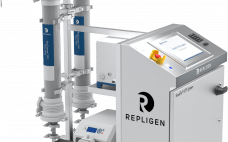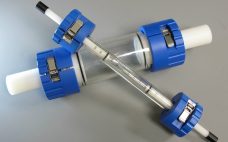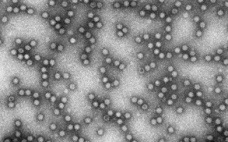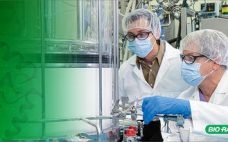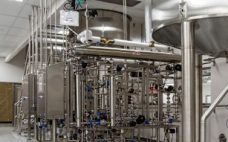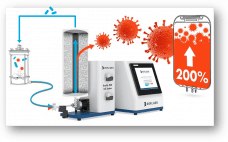This webcast features: David Serway, Global Director, Single-Use TFF Systems and ProConnex® Flow Paths, Repligen The explosive growth in biologics and gene therapies, the globalization of biomanufacturing, and the pressures to reduce capital investment and cost of goods while accelerating speed to market all point to changes in how bioprocessing systems/skids are designed, built, and operated. Future hardware, software, and consumables built on the principle of flexibility and extensive use of single-use, closed, complete, and ready-to-operate technologies will be described.…
Downstream
FPLC Column Selection Considerations
This webcast features: Dan Yukon, Head of North American Sales and Global Sales of SNAP Products, Astrea Bioseparations This presentation will outline various selection criteria when considering glass fast protein liquid chromatography (FPLC) columns for low-pressure chromatography. The topics will include: pressure and volume considerations column configuration (aspect ratio) materials of construction frit type, design porosity, and mounting connection types adjustability construction accuracy packing tube design storage. There are many types and brands of columns available on the market, and…
Advantage of Antibody-Based Selectivity in the Purification of Next-Generation Biologics
The webcast features:Â Laurens Sierkstra, Senior Director, Business Leader Purification, Thermo Fisher Scientific Advances in biotherapeutics are generating an increasing range of complex molecules that present unique and often complex purification challenges. Affinity chromatography can serve as a platform solution for the purification of these challenging molecule modalities. An effective affinity resin can help to simplify biomolecule purification, reduce the number of purification steps, and reduce the overall cost of goods in biotherapeutic manufacturing. By taking advantage of antibody-based selectivity, camelid…
Webcast: Enabling Digital Chromatogram Review for a Faster and More Reliable Operation
This webcast features:Â Martin D. Jensen, Senior Engineer, FUJIFILM Diosynth Biotechnologies Chromatogram review is a monitoring method used to verify process performance in packed-bed chromatography processes. By observing key process parameters such as chromatography column outlet conductivity or UV absorbance, it is possible to identify the signs of a poorly packed column, resin degradation, or equipment malfunction. The industry standard practice relies on performing a paper-based qualitative visual comparison of chromatography profiles against a reference batch. This approach leads to a…
Predicting Viral Clearance Using a Non-Infectious MVM Surrogate in Downstream Development
This webcast features: David Cetlin, Senior Director, R&D, Cygnus Technologies As viruses can arise during the manufacture of biopharmaceuticals, regulatory agencies require viral clearance validation studies for each biopharmaceutical prior to approval. These studies are typically conducted in biosafety level (BSL)-2 facilities and require large capital and human resources. Due to these hurdles, process knowledge pertaining to viral clearance is limited during development and characterization. The use of an accurate, economical, and quantifiable non-infectious viral surrogate would enable downstream purification…
To Compress or Not to Compress: What You Need to Know About Packing Resins at Process Scale
This webcast features: Dr. Mark A. Snyder, Manager, Process Chromatography, R&D Applications Group, Bio-Rad Laboratories Join our expert, Dr. Mark A. Snyder, to learn best practices and guidelines for successfully packing different types of chromatography resins. This includes incompressible resins like CHT Ceramic Hydroxyapatite Media as well as traditional compressible resins. CHT is an easy-to-use mixed-mode media and has high specific gravity, a rapid settling rate, and sensitivity to mechanical shear. These variations from traditional compressible resins have to be…
Accelerating mRNA-Based Therapy Development with Scalable Purification of In Vitro Transcribed mRNA
This webcast features: Kelly Flook, Senior Product Manager, Purification Products, Thermo Fisher Scientific The diversity of potential mRNA-based therapies has led to increased interest in using synthetic mRNA as a tool in the treatment of multiple diseases, such as cancer, stem cell therapies, and infectious diseases. Nevertheless, obtaining larger quantities of synthetic mRNA for clinical treatment remains a challenge. Currently available mRNA purification methods are becoming a bottleneck for large-scale manufacture as the limits of research-scale purification techniques are realized.…
Efficient and Rapid Purification of E. coli Expressed Toxin Recombinant Protein Fragments
This webcast features: Andrew Lees, PhD, Founder and Scientific Director, Fina Biosolutions, LLC Tetanus toxoid (TT) is frequently used as a carrier protein for conjugate vaccines. TT contains strong T cell epitopes. They are toxoided protein and are not a uniform product because of specific toxoiding and purification processes. TT tends to aggregate with age and is not affordable to produce in quantities for research and early clinical work. TT heavy chain fragment C (rTTHc) is the C terminal fragment…
Advantages of Custom Chromatography Resin Development: A Viable Solution for Purification of Complex Biotherapeutics
This webcast features: Scott Zobbi, Senior Manager of Business Development, Custom POROS Resins, Thermo Fisher Scientific Advances in biotherapeutic development are generating an increasing range of complex molecules, often presenting unique and complex purification challenges. Addressing these challenges requires novel purification strategies for commercial manufacturing, which may not always exist. When your specific process needs cannot be met with off-the-shelf resins, custom resin production may be a viable solution. Our POROS™ custom resin and CaptureSelect™ custom affinity matrix development platforms…
2.5× Lentiviral Vector Bioreactor Yield Increase and Simplified Execution with Innovative Tangential-Flow Depth Filtration
This webcast features: Michael Bransby, R&D Director of Process Technology, Repligen In a joint collaboration, Oxford Biomedica and Repligen increased the yield of viral vectors from suspension-cultured bioreactors several fold using tangential-flow depth filtration (TFDF). The yield for a single clarification step was 95% as compared to 70% by standard depth filtration. The TFDF tubular format and low shear enabled further yield increases through multiple harvests from the same seeding. A single seeded bioreactor produced two harvests of 95% and…

